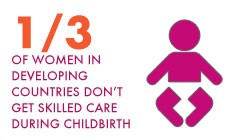
Email: eop.info@aspeninstitute.org
Phone: 202.736.5800
Geography: Global
Founded: 1950
Address:1 Dupont Circle NW
Washington, DC 20036
In the United States today, nearly forty percent of all children -- more than 30.5 million children -- live in low-income families. Those families led by women are significantly more likely to live in low-income households, with two-thirds living in poverty. Families led by single mothers make up almost two-thirds of families with children living in poverty. And for single mothers with at least one child under the age of six, the poverty rate is 58 percent for African Americans and 55 percent for Hispanics/Latinas, compared with 49 percent for Whites. As of the last Census report, about 55% of Native American children living in single-mother households were living in poverty.
While these statistics are dire, we have an opportunity to change families' economic security by leveraging their own strengths and assets, as well as those of their communities. Indeed, research shows that women persevere under such economic pressures. According to qualitative research conducted in 2009 by Greenberg, Quinlan and Rosen, single mothers are currently the only segment of the population that believes their children will fare better in the future.
And yet many policies and support programs focus solely on the parent or on the child. These separate strategies have not served the next generation well, as poverty in single-parent households persists. Data analysis consistently shows that the key predictors to a child’s long-term success include the educational achievement of both parents, yet particularly that of the mother, as well as the overall income and economic status of the family, and resilience of the mother and the extended family. A two-generation strategy is key to moving parents, especially women, and their children beyond poverty.
We believe that a country in which millions of families, especially those headed by women, are living in poverty is not an equitable or sustainable one. The long-term economic prosperity of our country is at risk when parents and children, both of whom are resilient in spite of great odds, struggle to achieve educational and economic success. Each of these values informs our belief that the solution is more powerful than the problem, and that we can – and will – create conditions that allow economic security for all families.